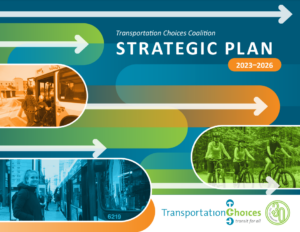 To develop our new strategic plan, a committee of TCC staff and board members worked together to evaluate our progress and challenges as an organization, to develop an inclusive engagement plan, and to execute on that plan – which included a statewide survey of individuals and partners, as well as one-on-one in-depth interviews with a diverse group of nonprofit, agency, and transportation leaders. We also brought together all of our board and staff members to reflect deeply on our mission, vision, and the values that guide our work.
To develop our new strategic plan, a committee of TCC staff and board members worked together to evaluate our progress and challenges as an organization, to develop an inclusive engagement plan, and to execute on that plan – which included a statewide survey of individuals and partners, as well as one-on-one in-depth interviews with a diverse group of nonprofit, agency, and transportation leaders. We also brought together all of our board and staff members to reflect deeply on our mission, vision, and the values that guide our work.We aimed to create a plan that was flexible and directional, recognizing that advocacy and policy work must be adaptable and evolve in order to stay strategic, responsive and relevant. This plan is straightforward enough to read cover to cover – and we invite you to do so here. It also includes some exciting updates that are worth calling out, specifically:
A mission and vision refresh: These statements represent TCC’s ongoing commitment to mobility justice, sustainability, and responding to emergent issues.
- Mission: Transportation Choices Coalition brings people together to advocate for safe, sustainable, and equitable transportation across Washington.
- Vision: We envision thriving, transit-oriented communities where people of every race, class, ability, and zip code can get where they need to go.
A set of defined values, to guide our work and actions both internally and externally:
- Mobility Justice. We believe mobility is a human right and that everyone should be able to get where they need to go, free of barriers, and with transportation options that work for them. We are dedicated to prioritizing those most impacted by transportation policies and historical disinvestment.
- Impact. We target bold, effective solutions to institutional and systemic transportation challenges across Washington. We advocate for progressive, upstream policies to fundamentally change how our state responds to issues such as the accelerating demands for just transportation, the increasing urgency of the climate crisis, and the ever-growing economic and social inequities that affect our communities.
- Relationship Building and Collaboration. We practice deep listening and inclusivity both within our internal team and with our external community partners. We’re committed to working through discomfort, holding space for conflict, and seeking authentic feedback. We aim to keep TCC’s culture warm and inviting for dialogue and participation, making TCC a great place to do great work.
- Integrity. We walk our talk. We value transparent communication and strive to be a trusted resource for our communities. We hold ourselves accountable for our mistakes and consistently seek feedback on how to further align our actions with our values and goals.
- Sustainability. We are committed to sustainability for ourselves, our organization, and our communities. We believe that all generations have the right to a clean planet and a healthy future with vibrant and plentiful transportation options. We prioritize policies and strategies that enhance the mobility of all Washingtonians while reducing our carbon footprint.
Strategic goals that integrate our commitment to racial equity and strengthen our commitment to transformative policy and advocacy work for communities across Washington.
- Advance holistic, intersectional transportation policies that support community safety, promote mobility justice, and combat climate change.
- Increase funding to accelerate sustainable, multimodal transportation improvements for all Washingtonians.
- Build public support by providing education and engagement around transportation and advocacy.
- Deepen statewide collaboration through coalition-building and partnerships rooted in authentic, trust-based relationships.
- Meaningfully advance racial equity and mobility justice in leadership, policy, and strategic engagement.
Finally, we want to recognize the many dedicated and committed partners and people who helped put this together: Our staff; our board of directors; the hundreds of individuals who responded to our calls for feedback; and dozens of transportation leaders and community partners who gave their time to help us prioritize where TCC should be orienting its energy and resources. We also want to thank the professionals who made this plan possible: the team at Cascadia Consulting for shepherding the process; and designers at Kimley-Horn who generously provided in-kind design assistance to make the final product.




